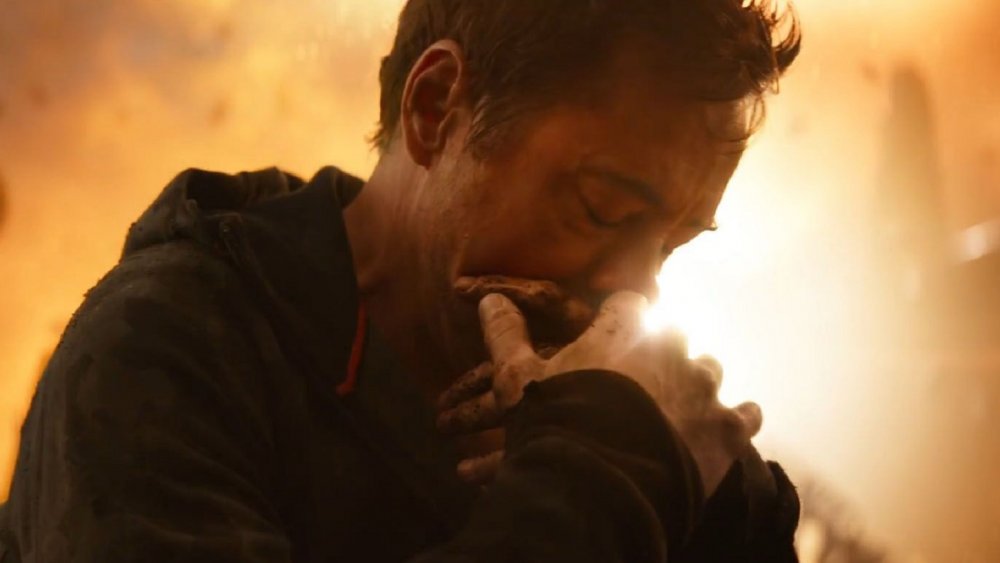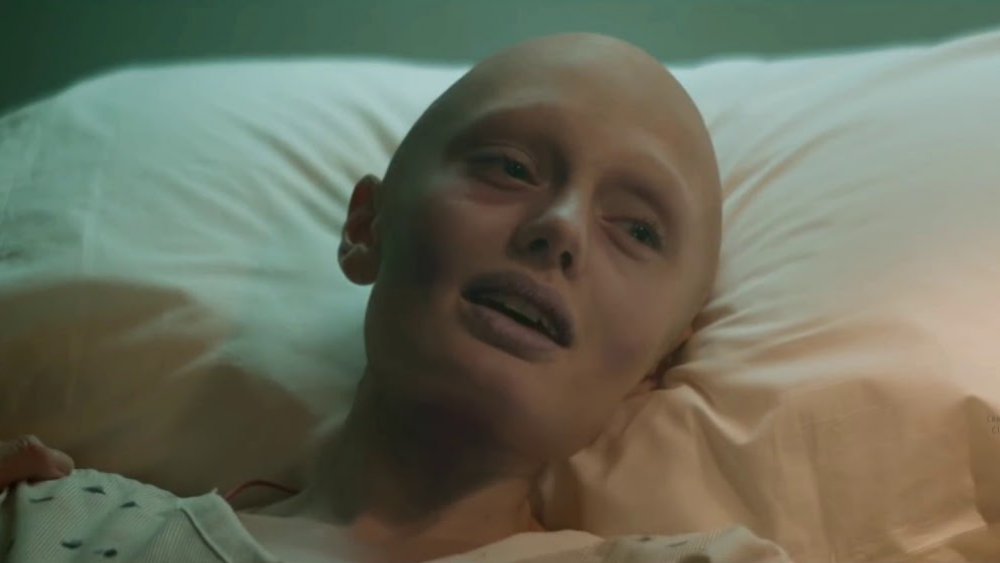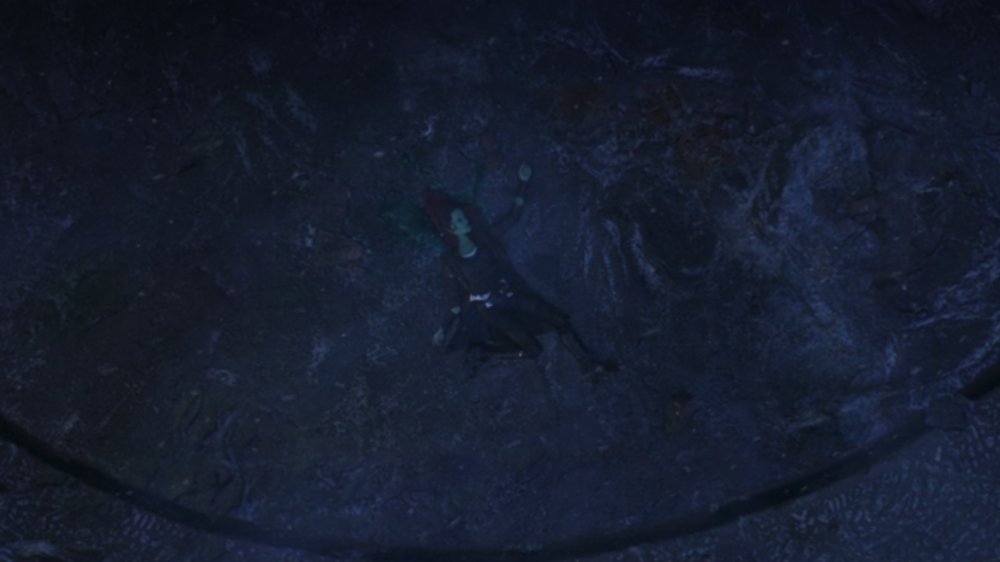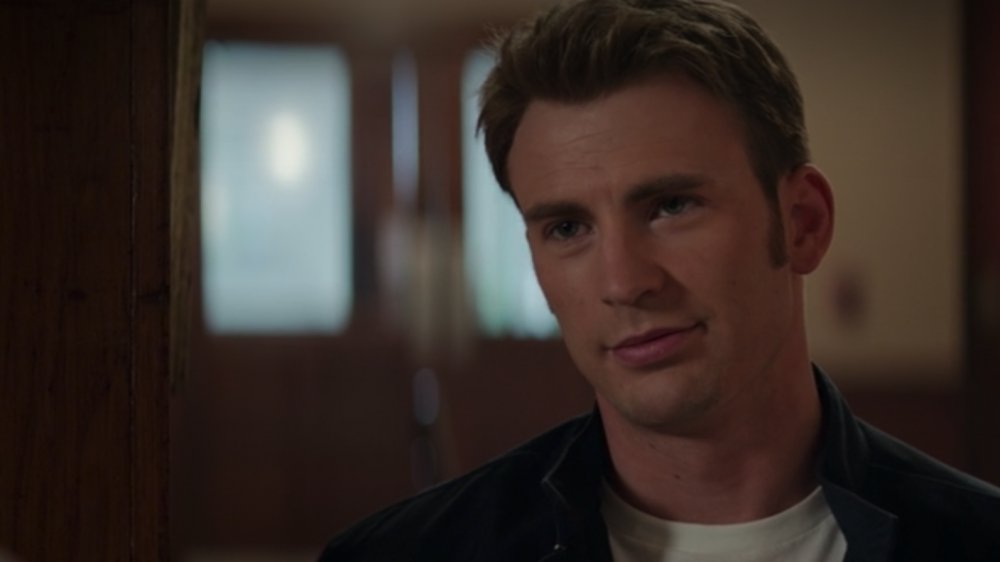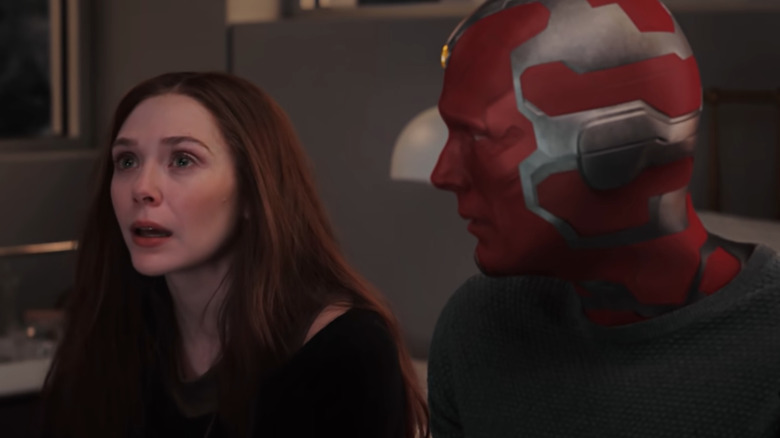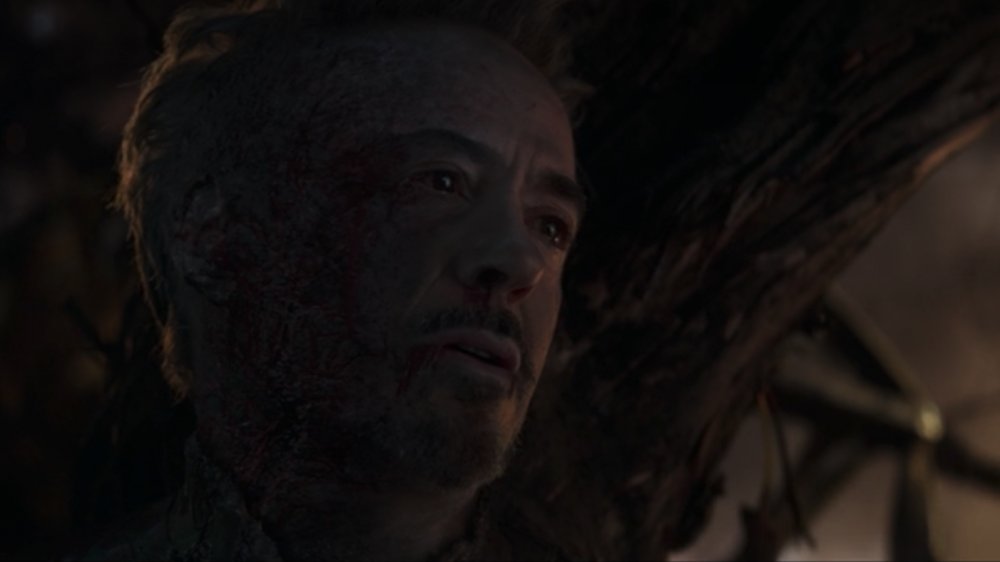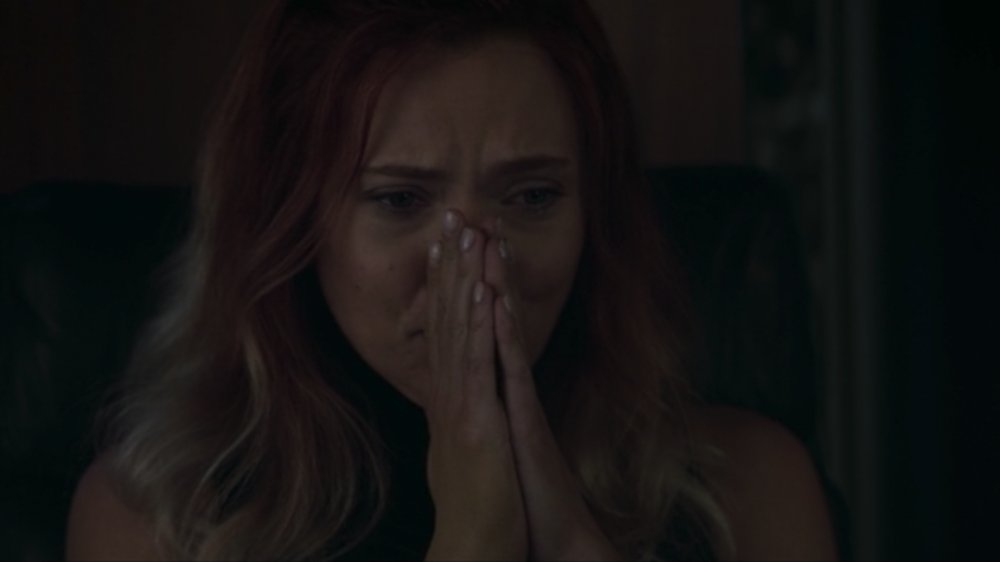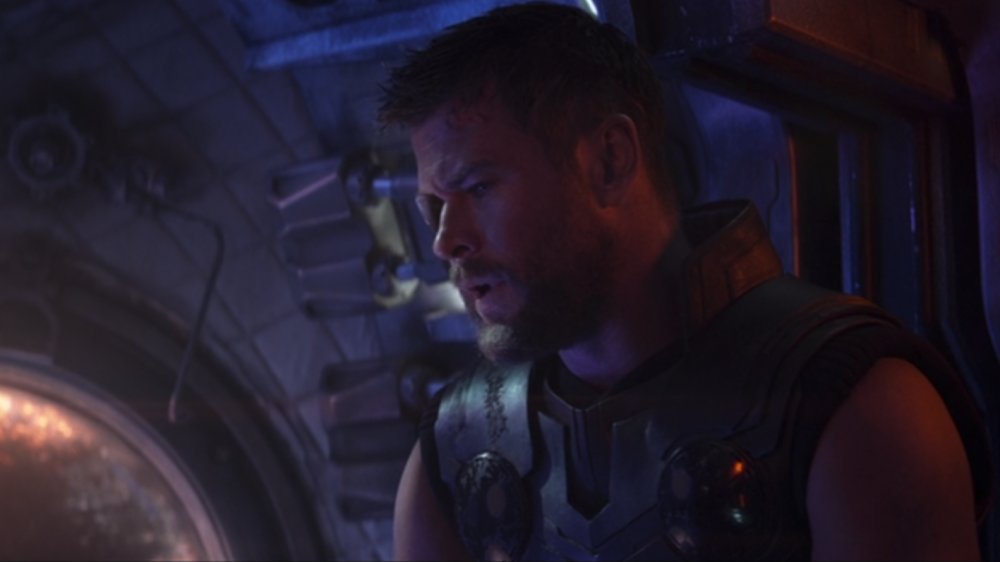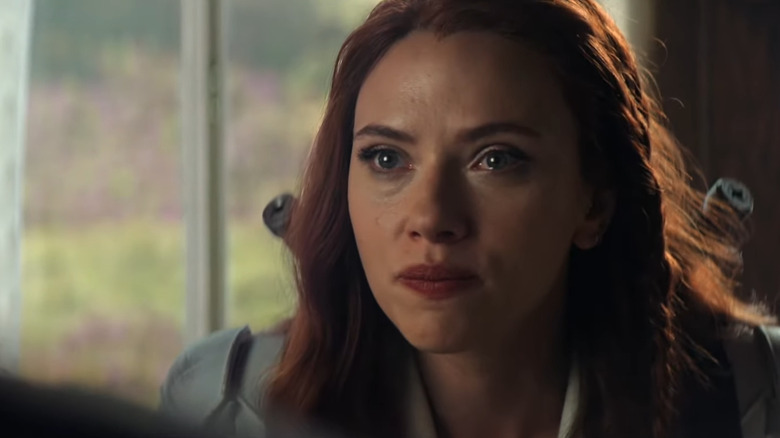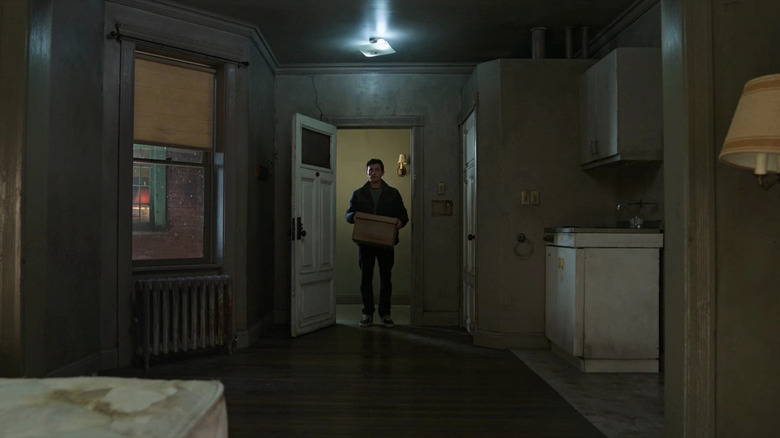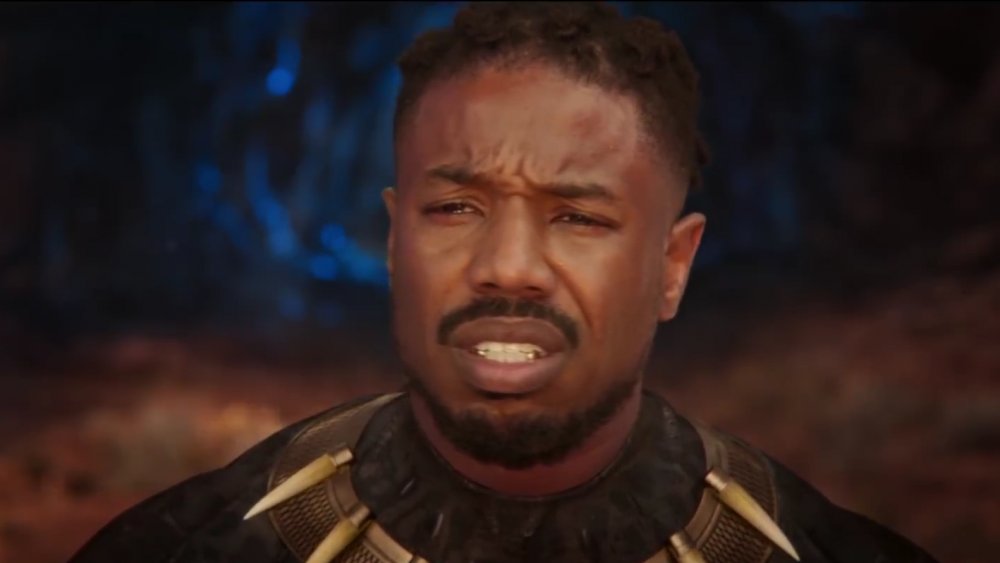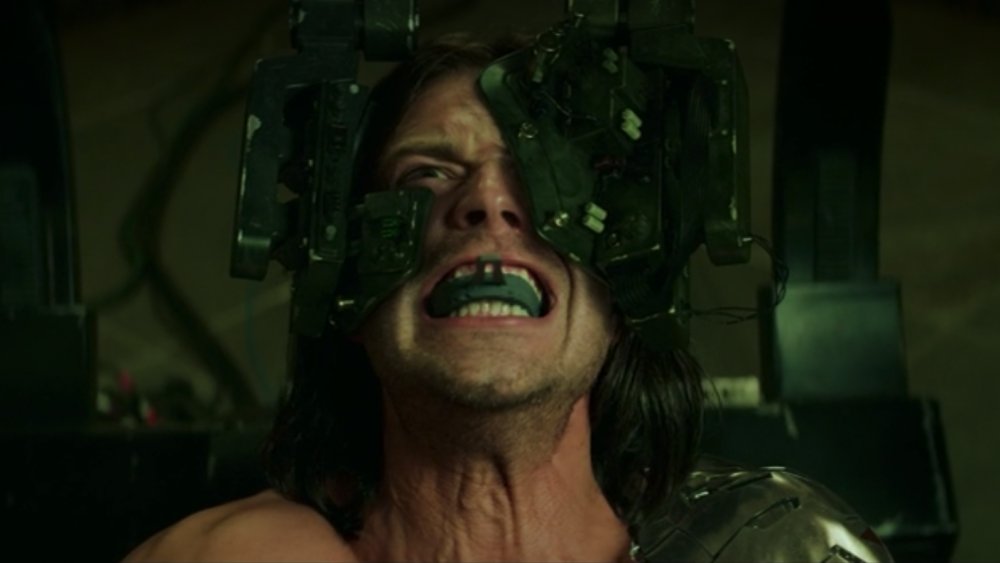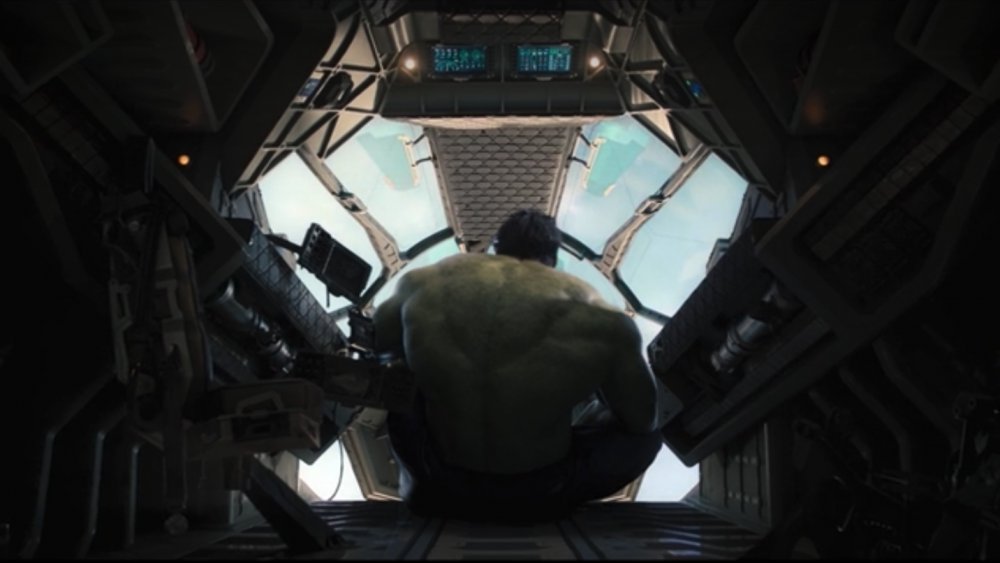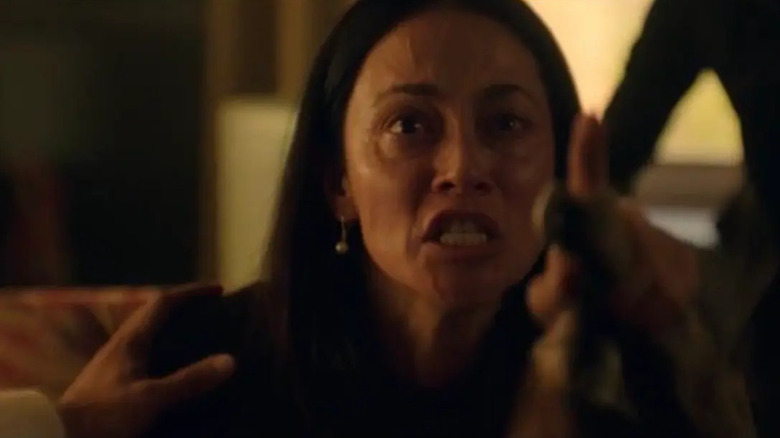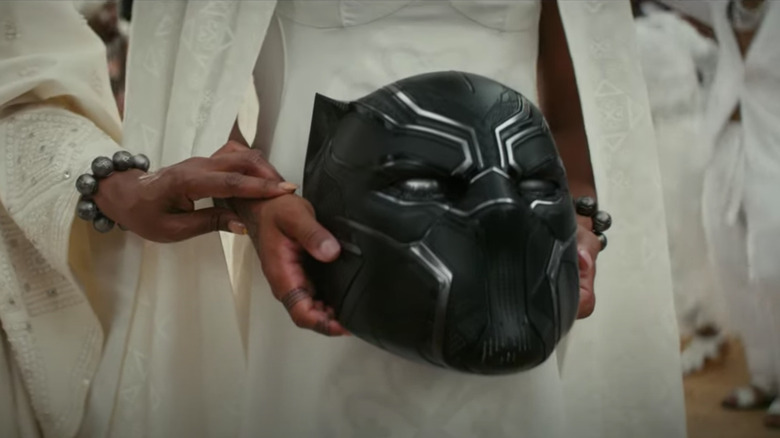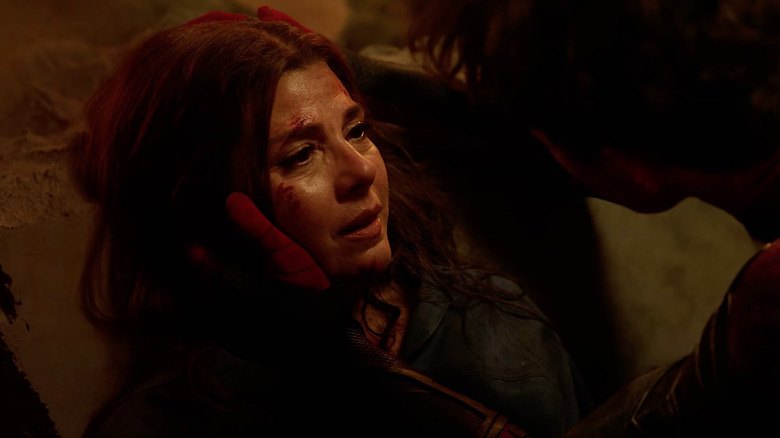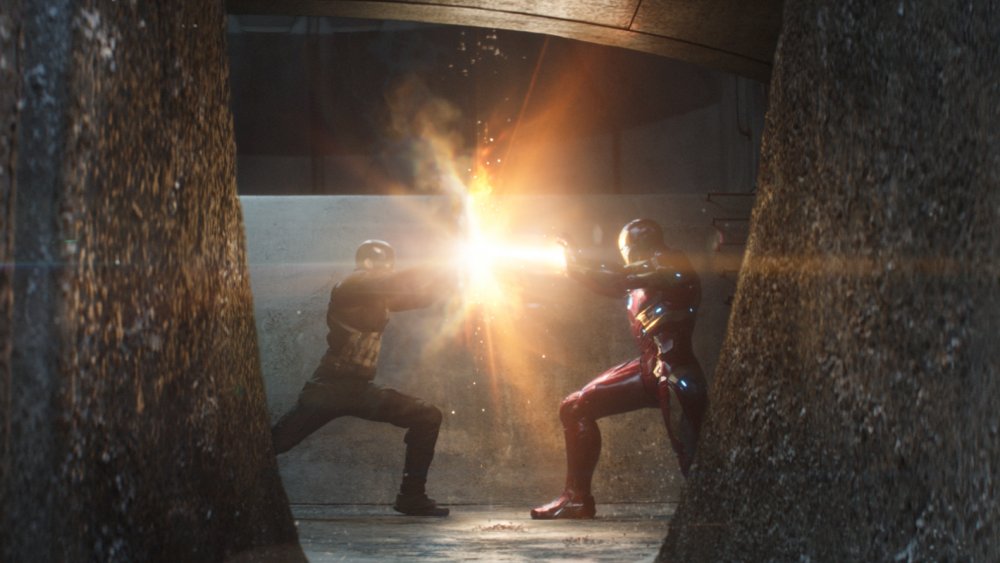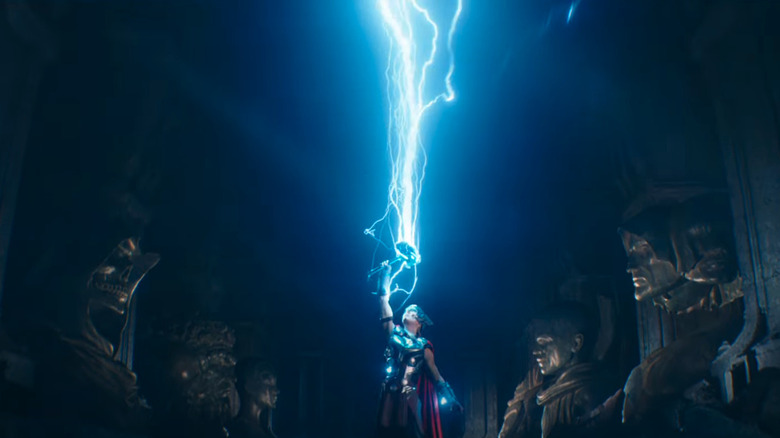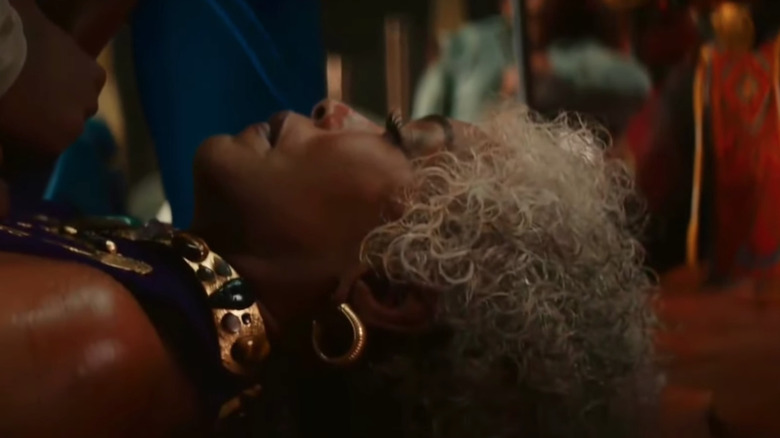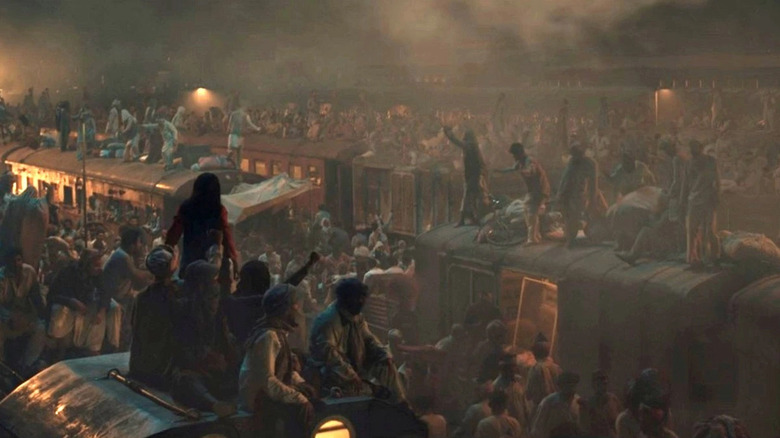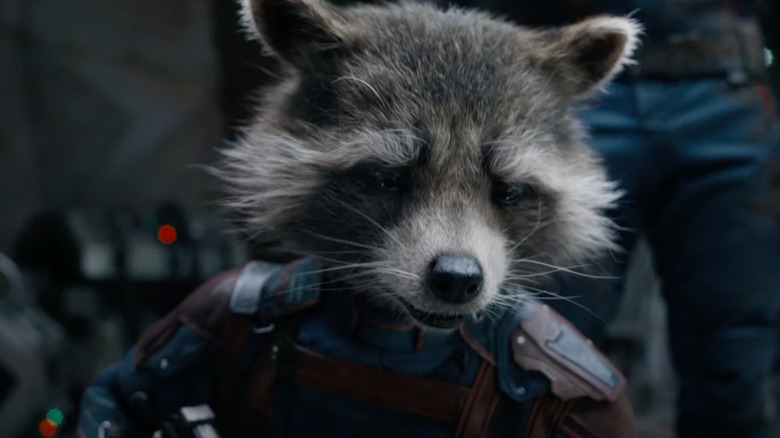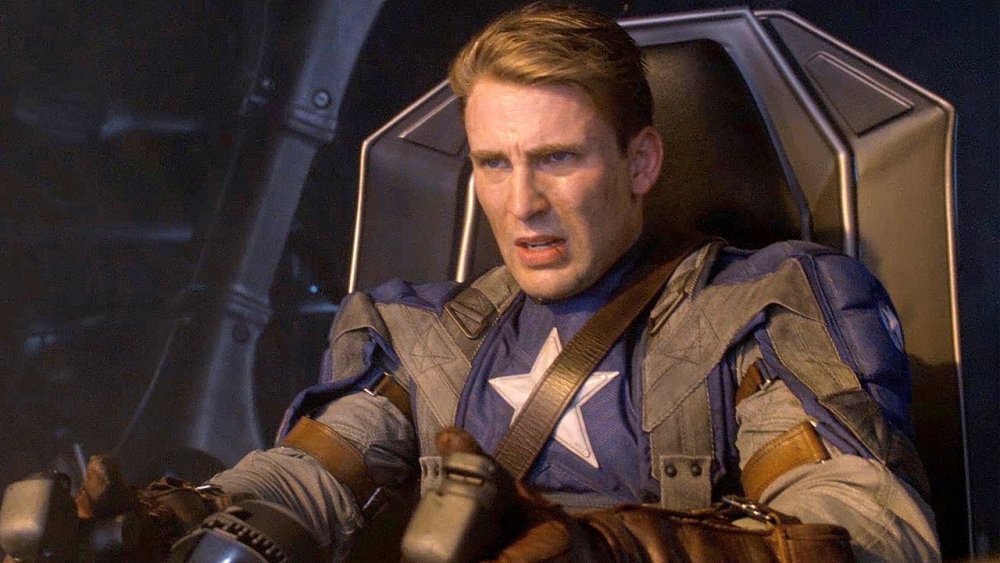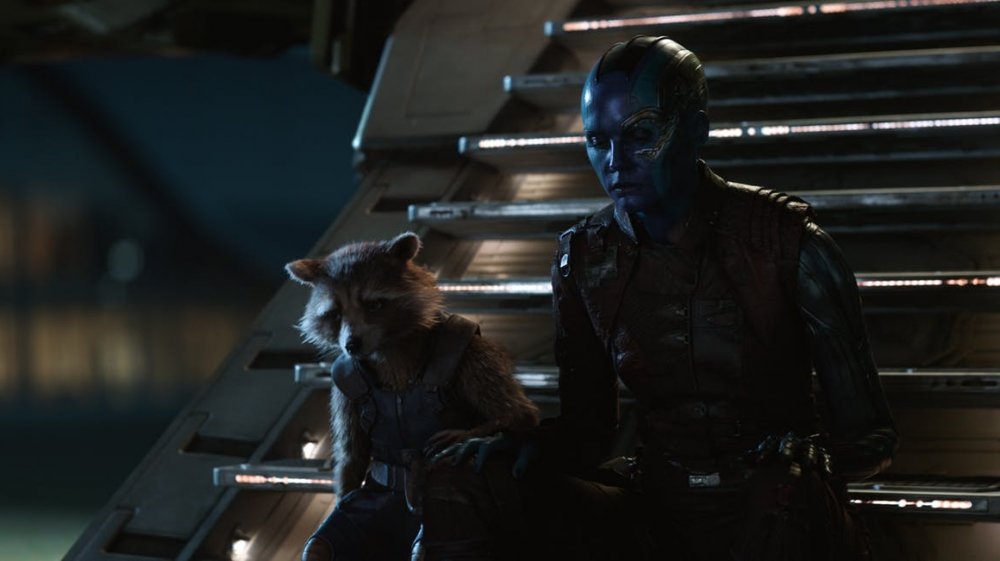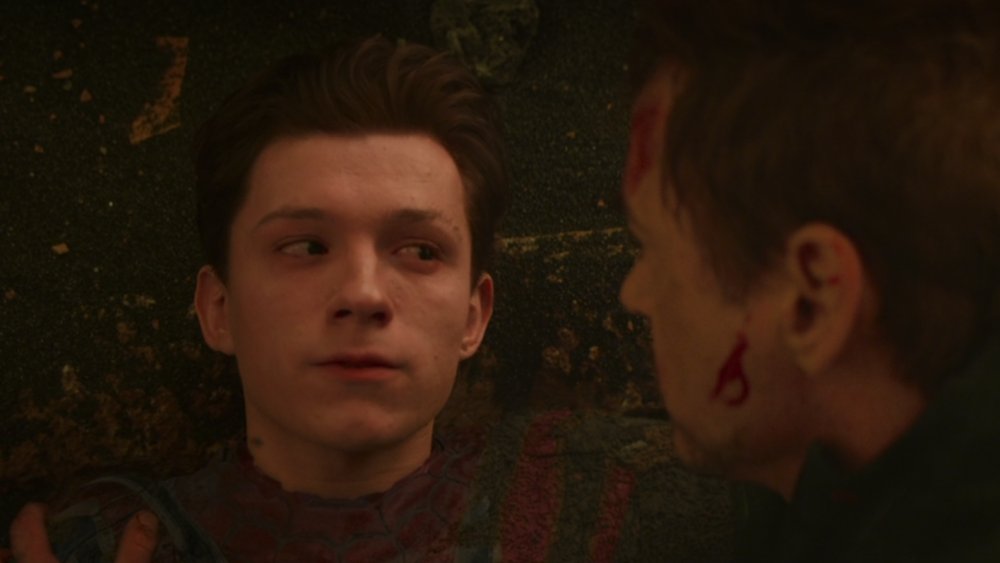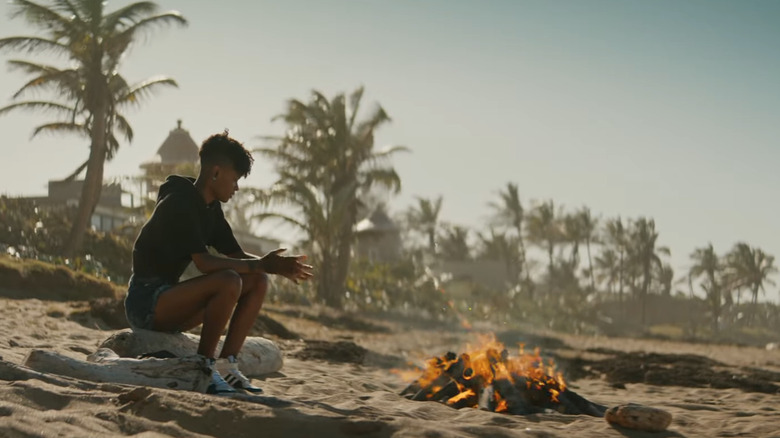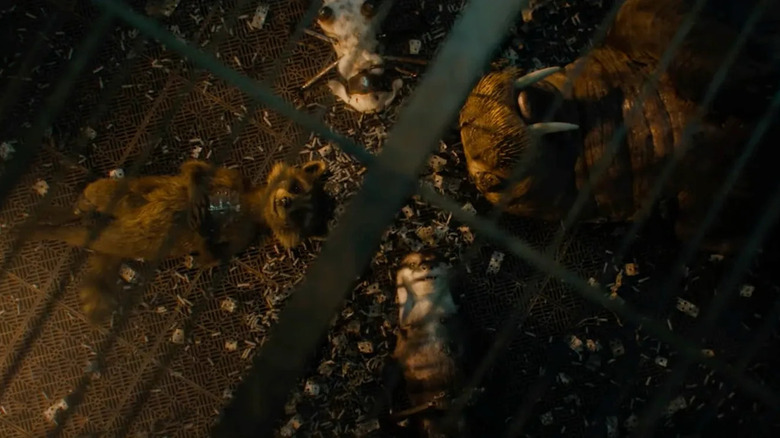The Saddest Moments In The MCU
The Marvel Cinematic Universe spans the emotional gamut. Films like Thor: Ragnarok and the Guardians of the Galaxy franchise can keep you rolling out of your chair, laughing all day long. Epics like the four Avengers films or Captain America: Civil War are about as dramatic as they get. Captain Marvel is the perfect prescription for a '90s nostalgia fix. Basically, if you're looking for a particular emotional experience, the MCU has got you covered one way or another — including if you're feeling a little melancholy.
It doesn't matter if you're talking about Thor losing his mother, Steve Rogers at Peggy Carter's funeral, Stephen Strange breaking down after his accident, or a slew of other scenes, there's no doubt that Marvel Studios knows how to hit the audience where it hurts. Naturally, some of these scenes are more distressing than others, which is why we decided to comb through the archives in search of the absolute best tearjerkers in the entire MCU canon.
While a subject like this is always open to speculation, we've tried to dig deep and find the sadder moments that are dripping with deeper meaning and tragic implications. So, without further ado, here's our official list of the saddest moments in the MCU thus far, presented for your lugubrious consideration.
(There are major spoilers below.)
Meredith Quill's final moments is one of the MCU's saddest scenes
James Gunn is a comedic genius that took an obscure superhero team and made them one of the world's most beloved household names. Most of the Gunn magic revolves around a steady mix of sarcasm and humor, occasionally broken by a dramatic scene that hits you in the gut. Yondu's funeral, "We are Groot," these are the scenes that take the Guardians franchise from shallow, light-hearted comedy to deeply appreciated, fan-favorite content.
Arguably the heaviest moment in the team's entire story, though, actually comes right at its inception. Guardians of the Galaxy opens up on a flashback sequence that takes the audience back to Earth in 1988. We witness a very young Peter Quill in a hospital, watching his mother, Meredith, in her last moments. As the scene unfolds, Peter is called in to see his mom on her deathbed, and we discover that his father is nowhere to be seen. With her dying breath, Meredith asks Peter to hold her hand, but the traumatized boy refuses the request, only for his mother to pass away moments later. This predictably leads Peter to run outside in a panic and, you know, be abducted by aliens. The scene is heavy, tragic, and totally misdirects from the quickfire comedy that follows.
Gamora's death broke our hearts
Avengers: Infinity War is a heck of a roller coaster ride that slowly leads to Thanos gaining the upper gauntleted-hand. But while obviously sad, it isn't necessarily the universe-shaking Snap at the end of the film that initially caught our attention. There's actually quite a bit of tragedy that takes place throughout the narrative, as well. As the movie progresses, we witness Loki and Heimdall meet their demise in the opening act of the film. And as the sun sets over Wakanda, we also see Thanos torture Wanda and Vision alike as he plucks the Mind Stone from the latter's animatronic skull.
However, the death that really pulls the hardest on the viewers' collective heartstrings has to be Gamora's. In the film, the rehabilitated heroine finds herself in the clutches of her villainous former boss and adoptive father. Even in captivity, she valiantly resists her parent-turned-captor with every ounce of her strength, but of course, the effort proves fruitless. It's Gamora who's ultimately sacrificed by Thanos in order to claim the Soul Stone during a scene that has to be among the saddest in all of the MCU. The desperation of the required sacrifice, the panic in her efforts to resist, the pain in the Mad Titan's eyes — it's too much to bear. The distress of the scene is perfectly summed up in their later exchange in the final moments of the film, in which child Gamora asks of the Snap, "What did it cost?" and Thanos replies, "Everything."
Steve Rogers is really unhappy
Steve Rogers is an unhappy soul. He may be the heart of the Avengers, the charismatic leader, and a valiant soldier, but at the end of the day, Rogers spends most of his superhero career as a man clearly out of his element and quite literally out of time. As he's bereft of his true love (at least until the very end of Endgame), we're perpetually reminded that Rogers doesn't have much to live for outside of his superhero career, and there's one scene in Captain America: The Winter Soldier that particularly sums the issue up.
Early in the film, Rogers pays a painful visit to the elderly Peggy Carter after which he heads off to find the soon-to-be Falcon, Sam Wilson. As the two veterans discuss future possibilities for Captain America in his new 21st-century life, Rogers explains that he doesn't even know what he would do with himself if he wasn't in the military. In response, Wilson eventually poses the question to his new "running man" acquaintance, "What makes you happy?" Rogers' response? "I don't know." The scene ends there, leaving things on a depressingly low note and perfectly summing up how tragically rudderless and alone Rogers feels after he goes into the ice in '45.
WandaVision beautifully handled grief
"WandaVision," Marvel Studios' first series for Disney+, successfully pulled off the feat of taking a minor underdeveloped romance between two secondary Avengers characters and elevating it into epic tragedy. Even if you didn't care much about Scarlet Witch and Vision's relationship before, the show made you invested with its surreal, sitcom-flavored exploration of the stages of grief.
The eighth and penultimate episode, "Previously On," is what truly elevates "WandaVision" above just an entertaining intellectual exercise, making audiences feel all the feels. It confronts the painful memories of all the loved ones Wanda Maximoff has lost: her parents, her brother Pietro/Quicksilver, and of course Vision himself. It's a memory of Vision comforting Wanda in the aftermath of Pietro's death that truly makes you understand why she loved him so deeply. Vision's line, "What is grief if not love persevering?" might be memed to death by now, but it really is a brilliantly-put piece of emotional insight.
Iron Man's sacrifice is tragic
Throughout the Avengers films, Tony Stark and Steve Rogers have a bit of a running argument about if it's better to sacrifice one's self to save others or if an alternative course of action should always be looked for. To put it in their own words, in The Avengers, Rogers tells Stark that, "You're not the guy to make the sacrifice play, to lay down on a wire and let the other guy crawl over you." And Stark instantly quips back, "I think I would just cut the wire." While the pair patch things up and eventually go on to lead the team together, the statement remains out there, haunting the Iron Man persona.
Sure, Stark demonstrates his willingness to sacrifice on multiple occasions, but realistically, it isn't until Endgame that he truly has something he doesn't want to give up under any conditions — his family. Over the course of the movie, we slowly see him let go, until, in the hour of need, he finally makes that long-awaited sacrifice play, donning the Infinity Gauntlet and snapping away Thanos' hordes. His ensuing death scene has all the feels as Stark slowly lets go of life, slipping away to finally find some well-earned rest.
Black Widow is having a hard time in 2023
Not surprisingly, Endgame and Infinity War show up a lot on this list. After all, the films represent the culmination of a ton of different storylines, and as such, they provide quite a few heavy moments. For example, take Black Widow. The Red Room trainee has a dark past, which she's in the process of leaving behind when she first appears on the scene all the way back in Iron Man 2. Putting her past behind her, Nat first puts in time as a S.H.I.E.L.D. operative and then pivots into a career as a full-time, bona fide super.
Throughout this journey, a persistent theme continues to resurface of her trying to wipe out the red in her ledger. While an argument could pretty easily be made that she manages to compensate for her debts pretty well before Thanos ever arrives on the scene, her eventual Gamora-style sacrifice in Endgame certainly puts her firmly in the black.
And yet, it isn't her death scene that we chose as the "saddest" moment. It's actually when we see her in the Avengers HQ right after the five-year time jump. Everything from the half-eaten peanut butter sandwich and her overly protective commands to her perpetually tear-filled eyes screams out "in pain" as we see the Avenger trying to recover from losing her superhero family. The desperately wistful scene leaves everyone with an empathetic pit in their stomachs, to say the least.
Thor and Rocket's counseling session
There's no doubt that Thor is absolutely tormented throughout the Infinity Saga. At various points, the god of thunder loses his family, his friends, his home, most of his people, his hammer, his health, and even his eye. While he remedies some of these losses, it doesn't change the fact that Thor has been through a lot, and there's one scene that underscores his pain more than all others.
In Infinity War, Thor, Rocket, and Groot head to Nidavellir to forge the son of Odin a new weapon. En route, the trio have a little conversation in which Rocket tries to awkwardly cheer up his downtrodden companion. In the ensuing conversation, Thor explains that, "Rage and vengeance, anger, loss, regret ... they're all tremendous motivators." As the pair discuss how tough it is to defeat Thanos, Thor eventually declares that fate wills that he should topple the Mad Titan. When Rocket asks what happens if he's wrong, Thor's tragic response is simply, "If I'm wrong, then what more could I lose?" Delivered complete with tears streaming from the tough-as-nails Asgardian's eyes, the scene is enough to rip your heart out.
Black Widow and the question of real family
Natasha Romanoff's whole life story is perhaps the saddest of any of the Avengers, and the "Black Widow" movie further emphasizes the horror and tragedy she experienced, while also revealing she had a family outside of the one she made herself with Earth's mightiest heroes. This family of Russian spies stationed in America forced Natasha and her sister Yelena into becoming Black Widow assassins, and processing how adoptive parents could do such terrible things to their children is at the center of the film's most emotional conversation.
Confronting her father Alexei and mother Melina at dinner, Natasha insists that they were never a "real" family. The parents' defenses of themselves are humorous, but Yelena's response is heartbreaking. Whether or not their family was "real," Yelena says, "It was real to me." She can't bear to handle the idea that "the best part of my life was fake." Florence Pugh's incredible acting really sells the anguish.
Peter Parker's friends forget who he is
Befitting its story's themes of sacrifice and struggle, the ending of "Spider-Man: No Way Home" is among the MCU's most bittersweet. With Doctor Strange's help, Peter is able to repair the damage that has been done to the fabric of the multiverse, but at great personal cost. The only way to undo the spell that ruined everything, he realizes, is to erase everyone's memories of who he is.
Before the new spell takes effect, Peter promises he will find and reunite with Ned and MJ again in the future. Though he prepares to reintroduce himself to MJ at the coffee shop she works at, however, he ultimately isn't ready to tell her everything. Seeing that MJ and Ned have gotten into MIT is enough to make him feel as if his sacrifice has helped his old friends, even if they don't realize it. The film ends with Peter moving into a run-down apartment and making his own suit to continue fighting crime — far less glamorous than interning with Tony Stark and working with the Avengers, but heroism often isn't glamorous.
Killmonger's final moments
Killmonger is regularly listed among the most popular of the MCU's long list of villains and with good reason. Excellently portrayed by Michael B. Jordan, the antagonist has a moving backstory that sets him up for one of the greatest final moments in all of MCU history — a moment that's so moving, it makes the cut for the list of the saddest moments of them all.
After an epic duel that sees T'Challa and his cousin brawl deep into the heart of the vibranium mines of Wakanda, the son of T'Chaka eventually gains the upper hand, stabbing Killmonger in his chest in the process. In a show of respect for his fallen enemy, T'Challa brings Killmonger out to witness the beauty of the sun setting over Wakanda. He then informs his relative that they can probably save him from the icy grip of death. Unmoved, Killmonger decides that he would rather bleed out than face captivity. His only request? "Bury me in the ocean with my ancestors who jumped from the ships because they knew death was better than bondage." The spine-tingling scene, laced with deeper meaning, is enough to move anyone to tears.
Bucky having his brain wiped is one of the saddest scenes in the MCU
Most of the scenes discussed so far revolve around final moments, last words, and impressive sacrifices. However, this next scene makes the list not because of sacrifice but thanks to its painfully harrowing nature. Few people in the MCU canon (perhaps with the exception of Thor) have gone through more pain and suffering than Bucky Barnes. The Winter Soldier endured decades of crypto freezing, brainwashing, and captivity while repeatedly being forced to kill against his will.
One scene in Captain America: The Winter Soldier helps to provide a brief glimpse into how desperately frustrating this must have felt for the victim. After a legendary duel in the streets with his forgotten pal, Steve Rogers, Barnes is confronted by Alexander Pierce, who questions his weaponized captive and discovers that his memory has been compromised by his run-in with Rogers. Pierce leaves the scene with the brief line to "wipe him and start over." As he walks away, a clearly despondent Bucky is strapped down and begins screaming as his brain is wiped. The agonizing scene is hopeless, tragic, and hard to watch, and it definitely ranks among the most distressingly sad scenes in the entire MCU canon.
Hulk leaving Earth is a tearjerker
Hulk is generally associated with smashing and destruction. Everyone wants to see the big green guy take on any enemy that comes his way (and even an occasional ally) in order to see if anything can actually stop him in his tracks. Occasionally, though, we get a glimpse of Hulk when he's not smashing, and it turns out that the character actually has some pretty intense feelings besides rage and anger.
In Ragnarok, we see the Jade Giant matured enough to speak in full sentences as he debates with Thor about what should be done. Eventually, Hulk even allows himself to become part of the combined "Professor Hulk" persona. When it comes to sad moments, though, Hulk has one that highlights the alienated hero's loneliness and desperation. In the final moments of Avengers: Age of Ultron, Hulk uses the Quinjet to head out into space all by his lonesome. He even sees an incoming video message from Nat, which causes him to pause. However, before Banner has a chance to get back on top, Hulk turns off the feed and curls up in a sorrowful, kid-like ball as he drifts off into space, leaving Romanoff — and the rest of us — depressed in spite of the movie's happy ending.
Moon Knight's tragic origin story
Here's another example of a Marvel Disney+ show revealing its emotional hand in the penultimate episode. "Moon Knight" Episode 5, "Asylum," finally reveals how and why Marc Spector created the separate identity of Steven Grant. Anyone who knows anything about Dissociative Identity Disorder could predict it wasn't going to be a happy story, to say the least, and the backstory was just as upsetting as you'd predict.
It turns out Marc had a younger brother, Randall, who drowned to death. His mother Wendy blamed him for his brother's death, and physically abused him while drowning her sorrows in alcohol. His father Elias desperately tried and failed to get them to reconcile. Marc created Steven as a coping mechanism to deal with all this trauma, with Steven going through life unaware of that their mother was so awful to them, not even realizing that she is now dead. These scenes are among the darkest in the MCU, and Oscar Isaac's dual performances as Marc and Steven confronting these memories are powerful.
If you or someone you know may be the victim of child abuse, please contact the Childhelp National Child Abuse Hotline at 1-800-4-A-Child (1-800-422-4453) or contact their live chat services.
Shuri's heartbreaking failure to save T'Challa
No matter what, "Black Panther: Wakanda Forever" was inevitably going to be one of the biggest tearjerkers in the MCU due to the real-life circumstances of the death of Chadwick Boseman, the original "Black Panther" star. Fortunately, the movie handles the death of King T'Challa appropriately, building its most powerful moments around the actors' real grief.
T'Challa dies off-screen in the opening scene of the sequel. Shuri is racing against the clock to try and synthetically recreate the heart-shaped herb to cure the unnamed illness that's killing her older brother. Her failure to save him hurts deeply. The whole nation of Wakanda gathers to mourn their king in a funeral that might make you cry from the sheer visual beauty alone — never mind those all-too-real tears from actress Letitia Wright as Shuri touches T'Challa's coffin before the airships elevate it up to the sky. And if that wasn't enough, the Marvel Studios logo plays in complete silence, with all of its typical movie clips replaced with images of Boseman.
Aunt May delivers the MCU's Uncle Ben moment
Given that fans had already seen two different versions of Spider-Man's origin story in live-action movies, it's understandable why the MCU decided to skip over the radioactive spider bite and the tragic death of Uncle Ben when introducing its new version of Peter Parker. Despite the undeniable logic behind this move, lacking the classic backstory left some fans feeling like there was an element of the character's essence missing in the Tom Holland "Iron Man Jr." version of Spider-Man.
"Spider-Man: No Way Home" proved particularly satisfying for those wishing the MCU Spidey was more strongly infused with the character's sense of loss and the ethos of "with great power comes great responsibility." Those words are finally spoken by Aunt May, who is fatally injured by the Green Goblin in an attack Peter feels tragically responsible for. The slowness with which this injury ultimately kills her only makes Peter's emotional pain even more intense, as he sits over her body praying she'll wake up even as the police begin to pursue him.
Tony and Steve, please stop fighting!
Most of the saddest moments in the MCU involve a villain and a hero. However, this one actually consists of two dearly beloved heroes at each other's throats. During the climax of Captain America: Civil War, Tony, Steve, and Bucky, egged on by Zemo, come to blows. The knockdown, drag-out fight eventually boils down to the two leaders of the Avengers, desperately fighting in hand-to-hand combat.
While Captain America eventually walks away technically the victor, the truth is that no one wins in Civil War, and the grudge match between two of its greatest members only serves to drag everyone down into the depths of despair. In fact, the sad scene ends up being the kickoff to one of the darkest periods of time in the entire history of the MCU, as the pair fail to reconnect for nearly the entire remainder of Phase Three, only reunited in Endgame after the Snap has taken place.
The Mighty Thor sacrifices herself
"Thor: Love and Thunder" is a sequel stuffed with many different plotlines and wild shifts in tone, and it is debatable how successfully it all coheres as a whole. Even so, the story of Jane Foster's struggle with cancer and her time as Mighty Thor still packs an emotional punch in the movie.
Transforming into a superhero temporarily gives Jane the strength and vitality she is losing to the disease, but rather than healing her, this transformation is stopping her body from responding to her chemotherapy. She's certain to die no matter what happens, so she chooses to go out heroically, powering up once again to save Thor from Gorr the God Butcher and destroy the Necrosword. Thor's reaction to his ex-girlfriend joining the battle is one of heartbreak, knowing what this means. She dies in his arms, whispering her ultimate decision for a catchphrase as the pair share one last laugh before she passes on to Valhalla.
An unexpected death in Wakanda Forever
Even if Boseman had lived long enough to star in "Black Panther: Wakanda Forever," it seems likely that the movie would have had at least one of the MCU's saddest scenes anyway. T'Challa is not the only character who dies in the film — it's Queen Ramonda who gets the most dramatic on-screen death sequence. Having this on top of T'Challa's death makes for an even more overwhelming emotional experience, for both the characters and the audience.
Ramonda's death is a heroic one, as she saves the young tech genius Riri Williams from drowning after Namor floods the Wakandan throne room. Okoye, who has already been stripped of her rank and struggling with feelings of failure, desperately tries to resuscitate her queen, but to no avail. It's devastating enough to hear Shuri cry for her mother; that Okoye also calls Ramonda "mother" in this scene shows just how powerful an impact this woman has made.
The partition flashback in Ms. Marvel
Marvel Studios has a mixed history when it comes to addressing real-world historical events in its superhero stories. There's a reason the Hiroshima scene from "Eternals" doesn't come anywhere close to this list, no matter how desperately it uses the historical tragedy for its own emotional ends. On the more positive side of things, however, is the way that "Ms. Marvel" dealt with the 1947 partition of India and Pakistan in Episode 5, "Time and Again" (another Marvel Disney+ show where the second to last episode is the most emotional).
The first half of the episode is set in the 1940s, showing Kamala Khan's grandmother Sana as a five-year-old lost in both the chaos of one of history's largest mass migrations and the personal tragedy of her mom being murdered by the Clandestine leader, Najma. Kamala, who has traveled back in time to this scene, uses her light-based powers to guide Sana back to her father — a reunion Kamala had already heard about in family stories.
Guardians of the Galaxy Vol. 3 opening credits
Even with the series' typical sense of humor and a well-earned happy ending, "Guardians of the Galaxy Vol. 3" may very well be the darkest movie in the MCU thus far. The threequel's more downbeat tone is on display right from its opening sequence. The opening credits of the first two "Guardians" movies had light dance sequences set to Redbone's "Come and Get Your Love" and ELO's "Mr. Blue Sky," respectively. The third movie, in contrast, opens with Rocket slowly walking around Knowhere while mumbling along to the acoustic version of "Creep" by Radiohead.
The lyrics to this classic rock bummer are particularly fitting to Rocket's personal angst, and the sequence lets the audience get wrapped up in his emotions. The saddest part of the scene comes when we see Peter Quill completely passed out drunk in his depression over losing Gamora — a bit of a surprise given there were no hints of him having a drinking problem in "Thor: Love and Thunder" or "The Guardians of the Galaxy Holiday Special," but in the context of the trilogy's story, it makes tragic sense.
If you or anyone you know needs help with addiction issues, help is available. Visit the Substance Abuse and Mental Health Services Administration website or contact SAMHSA's National Helpline at 1-800-662-HELP (4357).
Cap's sacrifice proves he's a true hero
Iron Man gave his life to save the universe, but that doesn't mean the Starkster has a monopoly on the whole "giving up your life to save others" schtick. In fact, it was none other than his colleague and inspiration Steve Rogers who first demonstrated how to lay down on the wire, particularly in one of the last scenes in his first titular film.
As Captain America: The First Avenger wraps up, Steve Rogers purposefully flies a plane into the ice in order to save thousands of lives. The scene is emotional as he sets up Peggy Carter's picture on the dashboard and talks with her over a radio down to the last second before the communication is suddenly cut off. It easily demonstrates the selfless attitude that initially won Abraham Erskine's respect and led the doctor to nominate Rogers to be the first super-soldier. While we learn after the fact that Rogers actually survives the crash, it doesn't change the tragic fact that he doesn't hesitate to let go of everything he holds dear in order to face near-certain death if he knows it will help others.
Rocket and Nebula share an incredibly sad MCU moment
The beginning of Avengers: Endgame is filled with heartbreaking scenes. Clint Barton loses his family, we hear and see the roll call of everyone who was lost in the Snappening, and Stark flips out on Steve Rogers in his frustration. However, there's one quick-fire moment that takes the cake as far as the sad stuff goes. When Captain Marvel discovers Stark and Nebula drifting through space, she brings them back to the Avengers compound as quickly as possible. Upon their arrival, all eyes are fixed on the Avengers themselves as they reunite, discuss their losses, and begin to head inside.
However, in the midst of the focus on Earth's Mightiest Heroes, we get a quick glimpse of Rocket and Nebula — the two remaining Guardians of the Galaxy — as they sit next to each other on the steps of the Benatar. Neither one utters a word, but as they sit in silence, realizing that they're all that's left of their galaxy-saving family, the two heroes go way out of character by holding hands in quiet solidarity. The emotional scene, depicting two of the coldest, most calculating heroes in the entire MCU, is enough to melt the hardest heart. Can someone pass the tissues, please?
Losing Spidey during the Snap makes us ugly cry
When it comes to sad moments in the MCU, it doesn't get any worse than the Snap. So many heroes are decimated by Thanos, from Black Panther to Drax the Destroyer, but the most sorrowful moment has got to be when Peter Parker literally bites the dust. As he begins to crumble from the inside, Parker at first declares that he doesn't feel so good and uncomfortably wonders what's happening. As the reality of his situation dawns on him, he falls into Tony Stark's arms, desperately stating that he doesn't want to go. As he slowly accepts the situation, he gives Stark a sideways look and quietly mutters that he's sorry before finally fading away. The moment is already deeply moving on its own, but knowing that Spidey actor Tom Holland actually improvised the scene only makes it that much more heartbreaking.
Shuri burns her funeral garments
Just as the opening scene of "Black Panther: Wakanda Forever" illustrates the sudden shock of death, the closing scene and end credits sequence beautifully capture the complex emotions of having to simultaneously remember those we've lost while still moving forward in life. At the end of the film, Shuri is finally able to observe the customary burning of her funeral garments to end her time of mourning.
As she burns the clothes, the film cuts to flashbacks of scenes from the first film — by far the most tasteful way including Boseman in the film could be handled. To give the whole audience time to process this all, the burning continues into the closing credits, as Rihanna's Oscar-nominated song "Lift Me Up" plays in the background. And then the mid-credits scene offers the audience one last bit of hope for the future, as we're introduced to T'Challa and Nakia's secret child — whose Haitian name is Toussaint, and whose Wakandan name is also T'Challa.
Every part of Rocket's backstory is agonizing
We knew Rocket's backstory was something upsetting from the hints about it in the first "Guardians of the Galaxy" movie, but finally getting to see it in "Guardians of the Galaxy Vol. 3" is something else entirely. The scenes of Rocket being physically tortured and experimented on by the High Evolutionary are incredibly difficult to watch, but what truly makes this story heartbreaking is the fate of young Rocket's friends and fellow captives.
The otter Lylla, the walrus Teefs, and the bunny Floor were experimented on in even more grotesque ways. They lived their entire lives in dark cages, believing the promise that they'd eventually live in the High Evolutionary's utopia. Rocket, whose intelligence earns him special one-on-one meetings with the High Evolutionary, initially believes this as well, until he learns that their batch of experiments is to be discarded as mere failures. Discovering that all their hope was a lie, Rocket tries to help his friends escape, only for them all to be killed by their creator.
When Rocket has a near-death experience later in the film, he either dreams about or temporarily finds himself in the afterlife with his old friends. He tearfully apologizes for failing to save them, but they seem to be at peace and Lylla tells Rocket his time to join them has not yet come. Shamelessly emotionally manipulative? Certainly, but that manipulation works.
